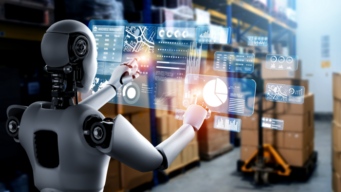In my previous blog entry relating to ERP I discussed how the automotive industry has become so reliant on these systems for running their day to day manufacturing operations. Implementing an ERP or B2B system are the two most labour intensive IT projects that can be undertaken by a company.
Quite often, ERP projects will use a large amount of IT resource and in many cases resources that would normally be used to manage B2B infrastructures will be diverted to an ERP project instead. This could potentially put a company’s B2B infrastructure at risk if any problems occur or if there are issues with on-boarding new trading partners for example. As ERP systems are integrated to nearly every aspect of how a company operates, if there are delays with either implementing a new system or upgrading to a new ERP version then this will have serious implications further down the line. But what about those companies who are keen to integrate their ERP and B2B systems? For companies that have either been newly divested from a parent company or find themselves in a position where they are switching to a new ERP vendor, this can sometimes offer the best time to integrate to a B2B platform. After all, the company will be able to start from a clean sheet of paper. At GXS we have seen an increase in the number of customers wishing to integrate their ERP and B2B systems together, and many as a result of trying to consolidate numerous instances of an ERP system which are located in different locations around the world.
Due to the demands placed on a company’s IT resource during an ERP related project, outsourcing the management of a B2B infrastructure and any associated integration to the ERP system can bring significant operational and financial benefits to a company. Quite often GXS are seen as an extension of the many IT departments that we work with around the world. So what are the key drivers for companies having to integrate their ERP and B2B systems together in the first place?
- Most data used by an ERP system is obtained from outside the organization
- Data that is fed into an ERP system is often inaccurate
- Lack of ERP/B2B integration can lead to less informed business decisions being made
- Integrating to global ERP instances can be a challenge
So let me just spend a few minutes looking at each of these drivers in turn
Most data used by an ERP system is obtained from outside the organization
Most data used by an ERP system is obtained from outside the organisation. ERP systems use information from a variety of external sources, for example distributors, logistics providers and financial services institutions. This information could originate in numerous business systems and could have been created using different industry related standards. Due to the global nature of many companies there are constant challenges with on boarding suppliers and getting them integrated to a company’s ERP platform. The on-boarding capabilities of a vendor such as GXS can really help to accelerate the speed with which new trading partners are on-boarded. Irrespective of their technical capabilities, GXS can ensure that trading partners have the correct electronic trading capability in place and at the same time provide a seamless integration to the ERP system.
Data that is fed into an ERP system is often inaccurate
As ERP systems receive information from a variety of external partners there is an increased chance that unchecked, inaccurate data could enter an ERP system. Quite often, information from external sources is not clean enough to be processed correctly by the ERP system. This will quite often lead to manual rework of the incorrect information to try and make it compliant. If unchecked information is allowed to enter an ERP system then there is a chance that it could spread into other business systems leading to inaccurate information being used across the extended enterprise. A simple mismatch of part numbers for example could lead to incorrect electronic documents being created which could result in delayed payments to suppliers.
One of the main benefits of integrating an ERP and B2B system is that it is then possible to establish what can best be described as a firewall around a company’s ERP system. The aim of the firewall is to protect the ERP system and ensure that incorrect data does not enter the system. Whether you are trying to protect your ERP system from information being sent in by customers and distributors, logistics providers, suppliers or financial institutions, integrating to a B2B system can provide a higher level of security around your ERP applications and downstream business processes.
Lack of ERP/B2B integration can sometimes lead to less informed business decisions being made
These systems need to process information from various internal and external sources. Business decisions, especially in tough economic times, need to be made in real time and this cannot be achieved if data has to be re-worked and re-entered into the system. Without a fully integrated ERP and B2B environment it is difficult to gauge the true pulse of how the company is operating. If a company does not have visibility into any potential problems then it is very difficult to take any corrective action.
For many companies, getting access to real time information and ensuring that the platform is available 24/7 is crucial to the operation of their business. For example many high tech manufacturers insist that their IT infrastructure does not go down near the end of a quarter so as not to affect sales. In another example, if a car manufacturer does not receive an ASN to notify them that parts are on their way to a factory then this can have downstream implications as well which could lead to a production line shutting down. Automating the flow of information via the integration of ERP and B2B systems ensures that business critical transactions can be processed in real time.
Integrating to global ERP instances can be a challenge
Globalisation has forced many companies to establish new manufacturing plants and offices around the world and as mentioned earlier, many companies operate multiple instances of ERP systems to support their global business. Ensuring that these instances are fully integrated to provide one enterprise wide view of ERP related information is a challenge. Having to work across different time zones and trading partner communities, who may be speaking multiple languages, can impact the overall efficiency of a supply chain as well.
Ne xt week I will discuss how B2B outsourcing can help address some of these issues. Until then I have a question for you, what challenges is your company facing with trying run ERP and B2B systems across your business?




